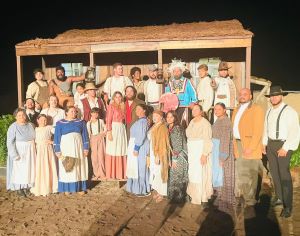A few not insignificant obstacles could have hindered the ECU Chamber Singers from returning to Europe later this spring for the World Series-Super Bowl-World Cup of international choral competitions:
*The search for a new director to succeed Dr. Andrew Crane, who guided the singers to a first-place finish in last year’s competition in Maribor, Slovenia, and a second-place finish the year before in Tolosa, Spain. He took a choral conducting position at Brigham Young University over the summer.
*A significant turnover among singers because of graduation.
*A decision on whether the university and its choral music program and this year’s singers could afford to compete in Bulgaria in May.
Game, set and match.
First, the university brought Dr. James Franklin from Sam Houston State University in Texas last summer to become interim director of choral activities; midway through his first year in Greenville his appointment became permanent. The choral music program, meanwhile, continues to attract outstanding talent, and despite whatever impact graduation might have had on last year’s group, this year’s ensemble has much the same skill, musicianship and vocal maturity of choral singers from previous years. And in January, the university provided some funds to enable the nearly 40 singers to take part in the competition in Bulgaria.
So, in the spacious setting of St. Paul’s Episcopal Church in late April, the Chamber Singers gave a preview of some of the music they will perform in the competition. A preview of the entire competition repertoire is planned May 9 at a site to be announced.
The Chamber Singers performed a wide range of material, from the Baroque to the present day, nearly all of it unaccompanied, and they responded to Franklin’s direction with great precision and skill. This included pieces not just in Latin, but also in German and Estonian. The focal point of the concert was “Take Him, Earth, For Cherishing,” written on commission by English composer Herbert Howells following the assassination of John F. Kennedy. Set to a 4th century poem, the piece has moments of sheer beauty, along with moments of despair and anguish, and Howells’ not-always-highly-accessible music was sung well. Franklin told the audience that, while it is considered a 20th century masterpiece, it is not easy to sing, and yet the young singers certainly seemed comfortable with the musical demands of the piece.
The concert contained many highlights, even if not all the music was well known to the audience. Four other selections in the concert that will be performed in Bulgaria showed how well trained the ensemble is, from the opening “Taaverti Laul” (based on Psalm 104) by Estonian composer Cyrillus Kreek that opened the program to “Die Mit Tränen Säen” by Baroque composer Johann Hermann Schein, with its tricky overlapping choral lines. Another piece that will be performed in Bulgaria was “Dum Medium Silentium” by Lithuanian composer Vytautas Miškinis, a piece that Franklin directed with his choral group in Texas last year. The piece is filled with close harmonies and cluster chords (think Ligeti but without the excessively sustained phrases), plus many repetitive passages in both music and words.
The program also included a lively spiritual, “Didn’t My Lord Deliver Daniel,” as arranged by Carl Haywood, and ended with the familiar early 19th century American hymn “Come Thou Fount of Every Blessing,” in Mack Wilberg‘s setting, with interesting key changes between verses. The Chamber Singers, accompanied nicely by St. Paul’s organist Andrew Scanlon on that hymn, also gave a splendid reading of Mendelssohn’s “Verleih uns Frieden,” perhaps the most familiar piece on the program, also with Scanlon’s accompaniment. And another real highlight was “Moonlight Lullaby,” written recently by bass Christopher Short and sung by an 11-member men’s ensemble.
While this was a showcase for the entire choral ensemble, soprano Rachel Webb sang a lovely solo verse in Ēriks Ešenvalds‘ “This Is My Father’s World,” and tenor Christopher Hester had a brief but fine solo in “Moonlight Lullaby.”
The ECU Chamber Singers are a true gem among the many School of Music ensembles at the university, and their showing in the two earlier international choral competitions demonstrate that the attributes local audiences might take for granted are highly regarded in the choral music universe. Despite their youth, they produce a gorgeous, mature sound, with great dynamic range and spot-on diction. One is not surprised that they are considered among the top choral singing groups in the world, at least as far as these invitational international contests are concerned.











